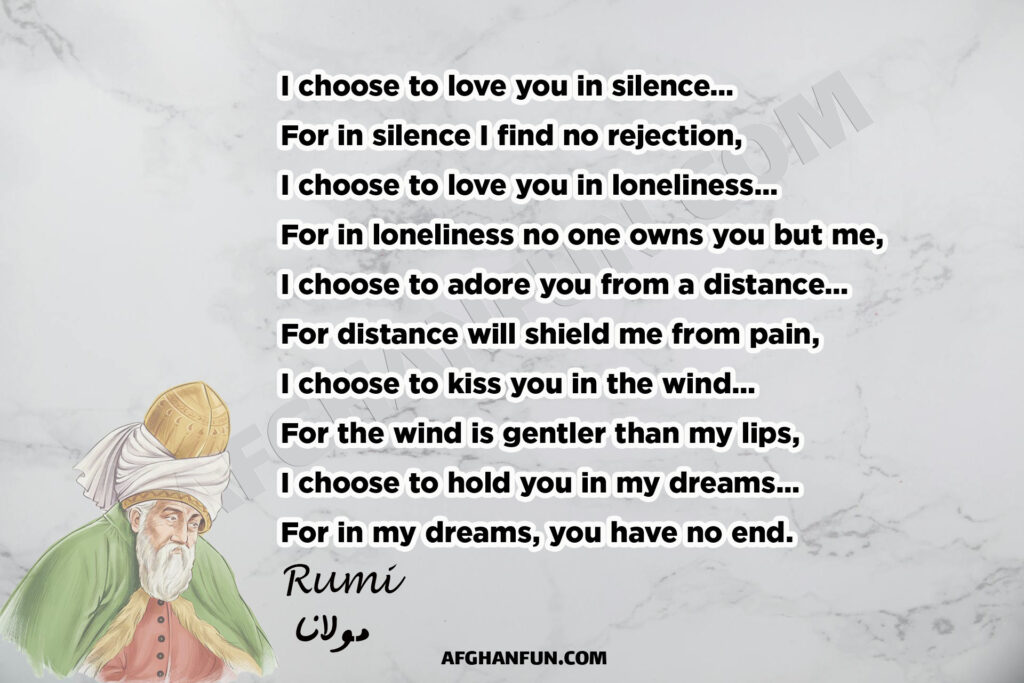A Beautiful Silence: Rumi’s Ode to Unspoken Love

I choose to love you in silence…
Rumi
For in silence I find no rejection,
I choose to love you in loneliness…
For in loneliness no one owns you but me,
I choose to adore you from a distance…
For distance will shield me from pain,
I choose to kiss you in the wind…
For the wind is gentler than my lips,
I choose to hold you in my dreams…
For in my dreams, you have no end.
The Beautiful Loneliness: Finding Ownership in Rumi’s Love
برگزیدم که در سکوت دوستت بدارم…
مولانا
زیرا در سکوت، جز حضور تو نیست و انکار راه ندارد.
برگزیدم که در خلوت تو را بجویم…
زیرا در خلوت، تو تنها برای منی و من تنها برای تو.
برگزیدم که از فاصله به تو بنگرم…
زیرا فاصله پردهایست که جان را از آتش وصال محفوظ میدارد.
برگزیدم که در نسیم تو را ببوسم…
زیرا نسیم، لطافتِ بیپایان تو را بهتر به جانم میرساند.
برگزیدم که در خواب تو را در آغوش کشم…
زیرا در خواب، تو بیکرانهای و پایان نمیپذیری.
این متن، در قالب زبانی عاشقانه و عرفانی، نمایانگر رابطهای عمیق میان عاشق و معشوق است، که در نگاه عرفان، معشوق میتواند نمادی از خداوند یا حقیقت مطلق باشد.
سکوت: سکوت در عرفان فضایی برای شنیدن صدای حقیقت است. در سکوت، انکار و حجابهای ذهنی کنار میروند، و عاشق در خلوص خود تنها با حضور معشوق مواجه میشود.
تنهایی: تنهایی در عرفان نه به معنای دوری از انسانها، بلکه به معنای رهایی از وابستگیهای بیرونی است. در اینجا، معشوق به تمامی از آنِ عاشق میشود، زیرا چیزی جز عشق باقی نمیماند.
فاصله: فاصله در نگاه عرفانی نه دوری فیزیکی، بلکه پوششی است که عاشق را از شدت آتش عشق محافظت میکند. این فاصله گاهی لازمهی حفظ تعادل روحانی است.
نسیم: باد یا نسیم نمادی از روح لطیف الهی است که بدون آسیب رساندن، حضور معشوق را به جان عاشق میرساند.
رؤیا: رؤیا یا خواب در اینجا نمادی از دنیای معنوی و ناآلوده است؛ جایی که زمان و مکان محدودیتی ندارند و معشوق جاودانه است.
Beautiful Distance: Rumi’s Shield Against Pain in Love
Баргузидам, ки дар хомӯшӣ дӯстат бидорам…
МАВЛОНО ҶАЛОЛУДДИН МУҲАММАДИ БАЛХӢ
Зеро дар хомӯшӣ, ҷуз ҳузури ту нест ва инкор роҳ надорад.
Баргузидам, ки дар танҳоӣ туро биҷӯям…
Зеро дар танҳоӣ, ту танҳо барои манӣ ва ман танҳо барои ту.
Баргузидам, ки аз масофа ба ту нигарам…
Зеро масофа пардаест, ки ҷонро аз оташи висол муҳофизат мекунад.
Баргузидам, ки дар насим туро бибӯсам…
Зеро насим, лутфи бепоёни туро беҳтар ба ҷони ман мерасонад.
Баргузидам, ки дар хоб туро ба оғӯш гирам…
Зеро дар хоб, ту бекаронӣ ва анҷом намепазирӣ.
Ин матн дар қолаби шеъри ошиқона ва ирфонӣ алоқаро байни ошиқ ва маъшуқ тасвир мекунад, ки дар назари ирфон маъшуқ метавонад рамзи Худованд ё ҳақиқати мутлақ бошад.
Хомӯшӣ: Хомӯшӣ дар ирфон фазое барои шунидани овози ҳақиқат аст. Дар хомӯшӣ, пардаҳои зеҳнӣ дур мешаванд ва ошиқ танҳо бо ҳузури маъшуқ рӯ ба рӯ мегардад.
Танҳоӣ: Танҳоӣ дар ирфон маънои дурӣ аз одамонро надорад, балки раҳоӣ аз вобастагиҳои берунӣ мебошад. Дар ин ҷо, маъшуқ комилан барои ошиқ аст, зеро ғайр аз ишқ чизе боқӣ намемонад.
Масофа: Масофа на дурии ҷисмонӣ, балки пӯшише мебошад, ки ошиқро аз оташи шиддати ишқ муҳофизат мекунад. Ин масофа гоҳе барои нигаҳдории тавозуни рӯҳонӣ зарур аст.
Насим: Насим рамзи рӯҳи латифи илоҳӣ аст, ки бе осеб расонидан, ҳузури маъшуқро ба ҷони ошиқ мерасонад.
Хоб: Хоб дар ин ҷо рамзи дунёи маънавӣ ва беолоиш аст; маконе, ки вақт ва макон ҳеҷ маҳдудияте надоранд ва маъшуқ ҷовидонӣ аст.
Beautiful Wind, Beautiful Dreams: Rumi’s Ethereal Love
اخترتُ أن أُحبّكَ في الصمت…
مولانا جلال الدین محمد الرومي
لأن في الصمت لا يكون إلا حضورُك، ولا مكانَ للإنكار.
اخترتُ أن أبحثَ عنكَ في الوحدة…
لأن في الوحدة، تكون لي وحدي وأكون لك وحدك.
اخترتُ أن أنظرَ إليكَ من البُعد…
لأن البُعدَ حجابٌ يحمي الروحَ من نار الوصال.
اخترتُ أن أُقبّلك في النسيم…
لأن النسيم يحمل لطفَكَ الذي لا نهايةَ له إلى روحي.
اخترتُ أن أحتضنكَ في المنام…
لأن في المنام تكون بلا حدود ولا نهاية.
هذا النص في صيغته الشعرية العاطفية والصوفية يعبر عن علاقة عميقة بين العاشق والمعشوق، حيث يمكن أن يكون المعشوق في التصوف رمزًا لله أو للحقيقة المطلقة.
الصمت: الصمت في التصوف هو فضاء لسماع صوت الحقيقة. ففي الصمت، تتلاشى الحجب الذهنية، ويصبح العاشق في مواجهة مباشرة مع حضور المعشوق.
الوحدة: الوحدة في التصوف ليست عزلة عن الناس، بل تحرر من الارتباطات الخارجية. وهنا يصبح المعشوق بالكامل ملكًا للعاشق، لأن الحب هو ما يبقى.
المسافة: المسافة ليست بُعدًا ماديًا، بل حجاب يحمي العاشق من شدة نار العشق. وفي بعض الأحيان، تكون هذه المسافة ضرورية لتحقيق التوازن الروحي.
النسيم: النسيم هو رمز للروح الإلهية اللطيفة التي توصل حضور المعشوق إلى روح العاشق دون إلحاق أي أذى.
الحلم: الحلم هنا هو رمز للعالم الروحي النقي، حيث لا وجود للزمان أو المكان، ويصبح المعشوق أبديًا بلا نهاية.
This beautiful Rumi quote expresses the profound depths of love, yearning, and the complex relationship between intimacy and distance. Let’s break it down, phrase by phrase, to understand its deeper meanings:
“I choose to love you in silence… For in silence I find no rejection”
In this opening line, the speaker begins by expressing a love that exists quietly, without the need for verbal declaration or outward expression. Silence here symbolizes a space free from judgment, confrontation, or rejection. To love “in silence” is to experience love without the vulnerabilities or risks that come with exposing one’s feelings, especially in the face of potential rejection. Silence can offer a kind of sanctuary, a place where love remains pure and untainted by external forces. This can suggest that the speaker’s love is deep, perhaps even unspoken, and exists outside of social expectations or pressures.
Interpretation: The speaker has chosen an inward, contemplative form of love, one that is safe from the potential harm or disappointment that might arise if expressed too openly. There’s a sense of emotional protection in silence.
“I choose to love you in loneliness… For in loneliness no one owns you but me”
Here, the speaker associates love with solitude, choosing to love in a state of loneliness. This line reflects possessiveness or an intense longing for the beloved to be theirs and theirs alone. The phrase “no one owns you but me” speaks to the speaker’s desire for exclusive emotional intimacy, perhaps driven by fear or desire for control. Loneliness, paradoxically, becomes a space where love thrives because it is undisturbed by external influences or other relationships.
Interpretation: This line shows a longing to possess the beloved in a deep and personal way. The speaker’s loneliness, instead of being a negative state, transforms into a form of emotional connection where the beloved is entirely the speaker’s, undivided by the world. This reflects the longing to be the sole object of the other’s affection.
“I choose to adore you from a distance… For distance will shield me from pain”
Adoration from a distance is a form of emotional self-protection. The speaker expresses a desire for admiration and love but with the safety of separation, indicating a fear of pain or heartache. Distance here may be physical, emotional, or even psychological—it keeps the speaker from the hurt that closeness might bring. This line can represent the conflict between deep yearning for connection and the simultaneous need to protect oneself from the vulnerability that closeness might create.
Interpretation: There is a tension here between the desire for love and the fear of the vulnerability that intimacy brings. The speaker may adore the beloved deeply but chooses to keep some distance to avoid the emotional risks associated with a more tangible connection. This distance might be out of self-preservation or a desire to maintain a sense of control.
“I choose to kiss you in the wind… For the wind is gentler than my lips”
This line is filled with beautiful imagery. A kiss in the wind suggests a kind of ethereal, fleeting affection that is not grounded in physicality. The wind, often a symbol of freedom, movement, and impermanence, offers a contrast to the permanence and intensity that a kiss might signify. The wind is also described as “gentler than my lips,” suggesting that the speaker’s emotions are too intense, perhaps too overwhelming, to be fully expressed through a physical kiss. The wind here is a soft, indirect way of conveying affection, symbolizing tenderness, freedom, and the inability (or unwillingness) to fully act on the desire to kiss.
Interpretation: The speaker desires closeness and affection, yet understands that their love is so intense it cannot be fully contained in a physical gesture. The wind represents a gentler, more subtle form of love, one that is not fully realized in the tangible world but exists more gracefully, free of the weight of attachment.
“I choose to hold you in my dreams… For in my dreams, you have no end.”
The final line brings the quote to a surreal, almost spiritual conclusion. Holding someone in dreams suggests a love that transcends the limitations of time and space. In dreams, the beloved can remain with the speaker indefinitely, without the constraints that reality imposes. The idea that “you have no end” speaks to the eternal nature of love as imagined in the dream world. In dreams, love is uninterrupted, untouched by the eventual separations and heartaches of life. The beloved becomes an idealized, unchanging presence, forever accessible and never fading.
Interpretation: The speaker embraces the idea of an eternal love, one that cannot be confined by time, death, or any kind of separation. In dreams, the beloved remains perfect, immortal, and unchanging, which reflects the way the speaker holds onto the idea of love without the fear of loss or decay that reality might bring.
Overall Interpretation:
This quote speaks to the paradoxes of love—its capacity to be both intensely fulfilling and deeply painful. The speaker navigates these complexities by choosing to love in ways that keep their emotions protected from the harshness of reality. Each choice reflects a different way of handling love’s inherent fragility:
- Silence represents the safety of unspoken love, free from the risk of rejection.
- Loneliness speaks to the desire for exclusive, undivided affection, while also creating a space of emotional isolation.
- Distance allows for admiration without the pain of intimacy.
- The wind provides a softer, more indirect form of affection, symbolizing the gentleness of love.
- Dreams present a form of love that is eternal, untouchable, and unchanging.
Ultimately, this quote explores a love that is deeply personal, possibly unrequited, and full of longing. It’s a love that exists more in the heart and mind than in the physical world, and one that might be more comfortable in its abstraction and idealization than in reality. The speaker’s choices reflect the tension between the desire for closeness and the fear of the vulnerability that closeness brings.
In a broader sense, it could also be seen as a meditation on the nature of unfulfilled or unattainable love—the kind that lives only in the imagination or in a perfect, idealized form. In dreams, love never ends; in life, it often does.
External links:
This Rumi quote, found on “AllPoetry” website











